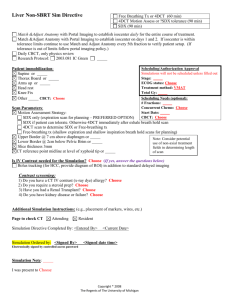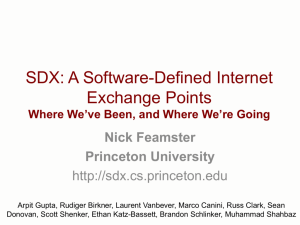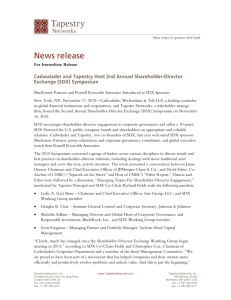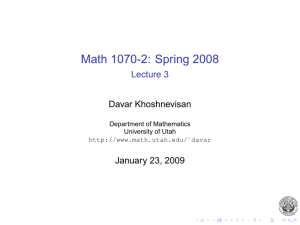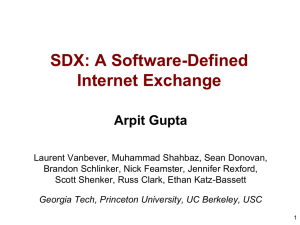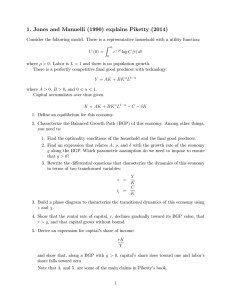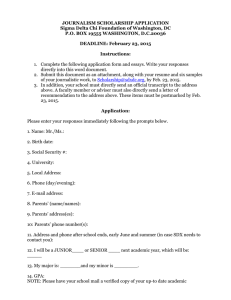SDX: A Software-Defined Internet Exchange Arpit Gupta
advertisement
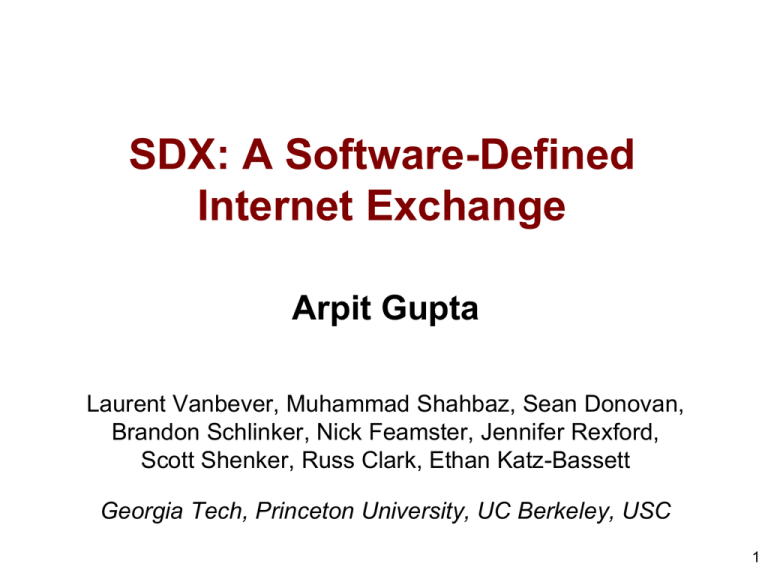
SDX: A Software-Defined Internet Exchange Arpit Gupta Laurent Vanbever, Muhammad Shahbaz, Sean Donovan, Brandon Schlinker, Nick Feamster, Jennifer Rexford, Scott Shenker, Russ Clark, Ethan Katz-Bassett Georgia Tech, Princeton University, UC Berkeley, USC 1 The Interdomain Ecosystem is Evolving ... Flatter and densely interconnected Internet* *Labovitz et al., Internet Inter-Domain Traffic, SIGCOMM 2010 2 …But BGP is Not • Routing only on destination IP prefixes (No customization of routes by application, sender) • Can only influence immediate neighbors (No ability to affect path selection remotely) • Indirect control over data-plane forwarding (Indirect mechanisms to influence path selection) How to overcome BGP’s limitations? 3 SDN for Interdomain Routing • Forwarding on multiple header fields (not just destination IP prefixes) • Ability to control entire networks with a single software program (not just immediate neighbors) • Direct control over data-plane forwarding (not indirect control via control-plane arcana) How to incrementally deploy SDN for Interdomain Routing? 4 Deploy SDN at Internet Exchanges • Leverage: SDN deployment even at single IXP can yield benefits for tens to hundreds of ISPs • Innovation hotbed: Incentives to innovate as IXPs on front line of peering disputes • Growing in numbers: ~100 new IXPs established in past three years* *https://prefix.pch.net/applications/ixpdir/summary/growth/ 5 Background: Conventional IXPs Route Server BGP Session IXP Switching Fabric AS A Router AS B Router AS C Router 6 SDX = SDN + IXP SDX Controller SDX BGP Session SDN Switch AS A Router AS B Router AS C Router 7 SDX Opens Up New Possibilities • More flexible business relationships – Make peering decisions based on time of day, volume of traffic & nature of application • More direct & flexible traffic control – Define fine-grained traffic engineering policies • Better security – Prefer “more secure” routes – Automatically blackhole attack traffic 8 Use Case: Inbound Traffic Engineering SDX Controller SDX AS A Router C1 C2 10.0.0.0/8 AS B Router AS C Routers 9 Use Case: Inbound Traffic Engineering Incoming Data C1 C2 AS A Router AS B Router 10.0.0.0/8 AS C Routers Incoming Traffic dstport = 80 Out Port C1 Using BGP Using SDX 10 Use Case: Inbound Traffic Engineering Incoming Data C1 C2 AS A Router AS B Router 10.0.0.0/8 Fine grained policies not possible with BGP AS C Routers Incoming Traffic dstport = 80 Out Port C1 Using BGP ? Using SDX 11 Use Case: Inbound Traffic Engineering Incoming Data C1 C2 AS A Router AS B Router 10.0.0.0/8 Enables fine-grained traffic engineering policies AS C Routers Incoming Traffic dstport = 80 Out Port C1 Using BGP ? Using SDX match(dstport =80) fwd(C1) 12 Building SDX is Challenging • Programming abstractions – How networks define SDX policies and how are they combined together? • Interoperation with BGP – How to provide flexibility w/o breaking global routing? • Scalability – How to handle policies for hundreds of peers, half million prefixes and matches on multiple header fields? 13 Building SDX is Challenging • Programming abstractions – How networks define SDX policies and how are they combined together? • Interoperation with BGP – How to provide flexibility w/o breaking global routing? • Scalability – How to handle policies for hundreds of peers, half million prefixes and matches on multiple header fields? 14 Directly Program the SDX Switch Switching Fabric A1 B1 match(dstport=80)drop match(dstport=80)fwd(C1) C1 C2 AS A & C directly program the SDX Switch 15 Conflicting Policies Switching Fabric A1 B1 drop? C1? match(dstport=80)drop match(dstport=80)fwd(C1) C1 C2 How to restrict participant’s policy to traffic it sends or receives? 16 Virtual Switch Abstraction Switching Fabric Virtual Switch A1 Virtual Switch AS B AS A B1 match(dstport=80)drop Virtual Switch AS C match(dstport=80)fwd(C1) C1 C2 Each AS writes policies for its own virtual switch 17 Combining Participant’s Policies Switching Fabric Virtual Switch p A1 AS B AS A match(dstport=80)fwd(C) PolA Virtual Switch B1 Virtual Switch AS C match(dstport=80)fwd(C1) C1 C2 PolC Policy(p) = PolA PolC 18 Building SDX is Challenging • Programming abstractions – How networks define SDX policies and how are they combined together? • Interoperation with BGP – How to provide flexibility w/o breaking global routing? • Scalability – How to handle policies for hundreds of peers, half million prefixes and matches on multiple header fields? 19 Requirement: Forwarding Only Along BGP Advertised Routes 20/8 A SDX B 10/8 C match(dstport=80) fwd(C) 20 Ensure ‘p’ is not forwarded to C dstip = 20.0.0.1 dstport = 80 A p SDX 20/8 B 10/8 C match(dstport=80) fwd(C) 21 Solution: Policy Augmentation 20/8 A SDX B 10/8 C (match(dstport=80) && match(dstip = 10/8)) fwd(C) 22 Building SDX is Challenging • Programming abstractions – How networks define SDX policies and how are they combined together? • Interoperation with BGP – How to provide flexibility w/o breaking global routing? • Scalability – How to handle policies for hundreds of peers, half million prefixes and matches on multiple header fields? 23 Scalability Challenges • Reducing Data-Plane State: Support for all forwarding rules in (limited) switch memory (millions of flow rules possible) • Reducing Control-Plane Computation: Faster policy compilation (policy compilation takes hours for initial compilation) 24 Scalability Challenges • Reducing Data-Plane State: Support for all forwarding rules in (limited) switch memory millions of flow rules possible • Reducing Control-Plane Computation: Faster policy compilation policy compilation could take hours 25 Reducing Data-Plane State: Observations • Internet routing policies defined for groups of prefixes.* • Edge routers can handle matches on hundreds of thousands of IP prefixes. *Feamster et al.,Guidelines for Interdomain TE, CCR 2003 26 Reducing Data-Plane State: Solution Group prefixes with similar forwarding behavior 10/8 40/8 20/8 SDX Controller 27 Reducing Data-Plane State: Solution Advertise one BGP next hop for each such prefix group forward to BGP Next Hop 10/8 40/8 20/8 Edge router 28 Reducing Data-Plane State: Solution Flow rules at SDX match on BGP next hops forward to BGP Next Hop 10/8 match on BGP Next Hop fwd(1) 40/8 fwd(2) 20/8 Edge router SDX FIB 29 Reducing Data-Plane State: Solution For hundreds of participants’ policies, few millions < 35K flow rules 30 Reducing Control-Plane Computation • Initial policy compilation time – Leveraged domain-specific knowledge of policies – Hundreds of participants requires < 15 minutes • Policy recompilation time – Leveraged bursty nature of BGP updates – Most recompilation after a BGP update < 100 ms 31 SDX Testbed • Mininet-based Testbeds – Uses Transit Portal – Emulates edge routers • Check out our demo – Application specific peering – Inbound traffic engineering • Github repo: https://github.com/sdn-ixp/sdx/ 32 Summary • SDN-based exchange (SDX) is promising for fixing Internet routing • Solved various challenges in building a real deployable SDX • Many open research problems, both for building and using SDX 33

